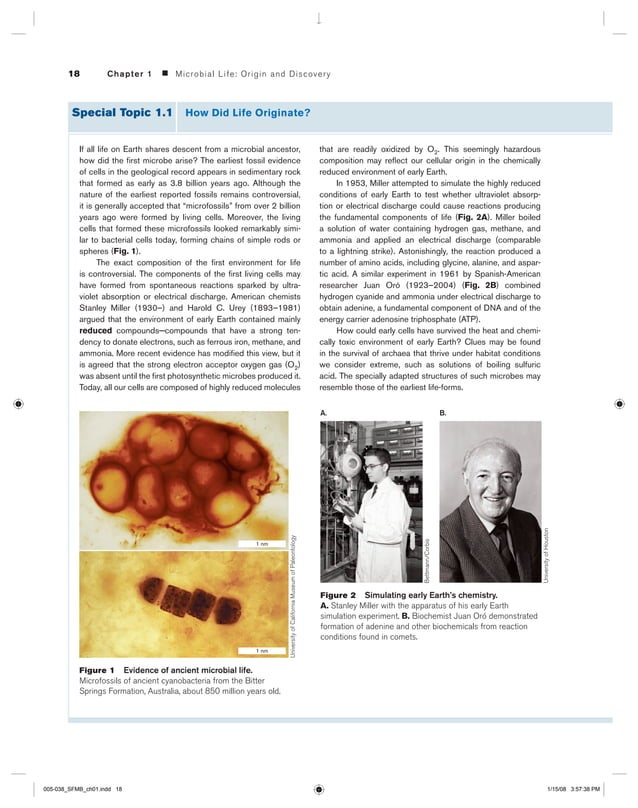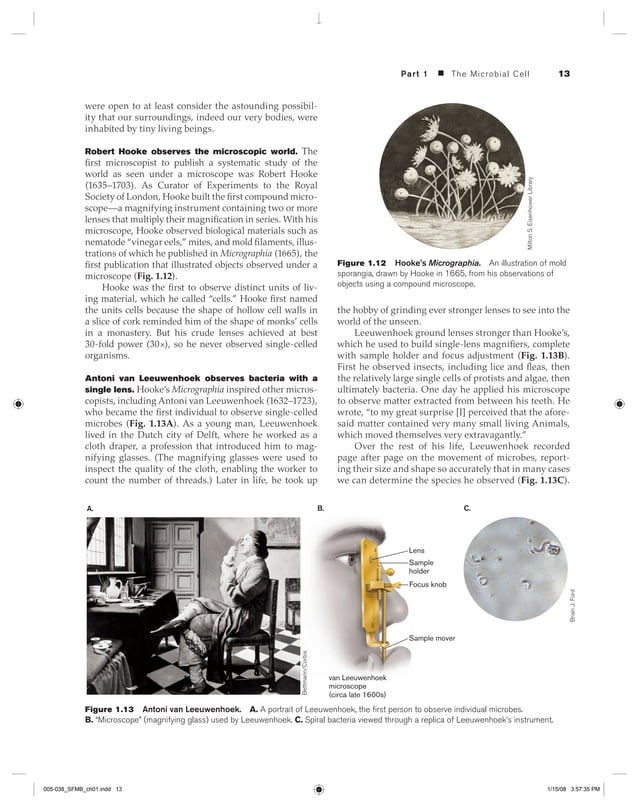Have you ever wondered about the tiny organisms that inhabit our world, influencing everything from the food we eat to the air we breathe? These microscopic beings, often invisible to the naked eye, are the subject of microbiology, a dynamic and ever-evolving field. From the discovery of penicillin to the development of CRISPR gene editing, microbiology has played a pivotal role in shaping our understanding of life and influencing advancements in medicine, agriculture, and environmental science.

Image: www.slideshare.net
One of the most comprehensive and trusted resources for exploring this fascinating realm is Microbiology: An Evolving Science, 4th Edition. This textbook, renowned for its clarity, accessibility, and engaging approach, provides a detailed and updated look at the world of microbes and their profound impact on our lives. Whether you are a student, researcher, or simply someone with a curious mind, this book serves as an invaluable guide to understanding the intricate mechanisms and profound significance of microbiology.
Delving into the Microcosm: A Look at Microbiology: An Evolving Science, 4th Edition
Microbiology: An Evolving Science, 4th Edition stands out as a comprehensive and meticulously crafted textbook, capturing the essence of this ever-evolving field. Authored by a team of prominent microbiologists, the book seamlessly blends scientific rigor with engaging narratives, making complex concepts accessible to a wide audience. From the fundamental principles of microbial structure and function to the latest breakthroughs in fields like immunology, genetics, and biotechnology, the 4th edition offers a comprehensive and up-to-date exploration of the microbial world.
Key Features of the Textbook:
- Clear and Concise Writing Style: The authors prioritize clarity and simplicity, ensuring that readers grasp key concepts effectively without sacrificing scientific accuracy.
- Engaging Visuals: Numerous, high-quality illustrations, diagrams, and photographs enhance understanding and make the learning process more interactive.
- Real-World Applications: The book connects microbiology to real-world scenarios, demonstrating its relevance to various aspects of our lives, including health, disease, food production, and environmental sustainability.
- Balanced Coverage: Microbiology: An Evolving Science, 4th Edition provides a balanced overview of foundational concepts and cutting-edge research, ensuring readers gain a comprehensive understanding of the field.
- Thorough Revision and Updates: The 4th Edition incorporates the latest research and advancements in microbiology, reflecting the dynamic nature of this scientific field.
Navigating the Sea of Microbial Knowledge
Microbiology, a vast and dynamic field, encompasses a myriad of interconnected topics, ranging from the basic structure of microbial cells to the intricate mechanisms of disease and the potential of microorganisms for bioremediation and biofuel production. Microbiology: An Evolving Science, 4th Edition facilitates a thorough exploration of these diverse aspects, providing a comprehensive framework for understanding this crucial scientific domain. The book covers key areas of investigation, including:

Image: www.slideshare.net
Fundamental Principles:
The book lays a strong foundation by introducing essential concepts like the structure and function of microbial cells, their diversity and classification, and the fundamental principles of microbial growth and metabolism. These core ideas form the bedrock for understanding the complexities of the microbial world.
Microbial Genetics and Genomics:
The 4th edition delves into the fascinating world of microbial genetics and genomics, exploring the molecular mechanisms of DNA replication, transcription, and translation. It discusses the power of genetic tools for manipulating and understanding microbial processes, advancing our understanding of microbial evolution and adaptation.
Microbial Ecology and Biodiversity:
Microorganisms play vital roles in shaping our planet, from decomposing organic matter to maintaining soil fertility. The textbook explores the intricate relationships between microbes and their environments, emphasizing the diversity and importance of microbial communities in various ecosystems.
Microbial Pathogenesis and Infectious Diseases:
Human health is inextricably linked to the microbial world. The book delves into the mechanisms of microbial pathogenesis, exploring how microorganisms cause diseases, and the multifaceted interactions between microbes and their human hosts. The 4th edition also examines the crucial role of the immune system in combating infections and the development of novel strategies for combating infectious diseases.
Applications of Microbiology:
Microbiology is not just a field of academic pursuit; it has profound applications in various industries. The book explores the critical roles of microorganisms in food production, bioremediation, biotechnology, and medicine. It discusses emerging areas like microbial fuel cells, the use of microbes for bioremediation, and the development of novel antimicrobial therapies.
Staying Ahead: Trends Shaping the Future of Microbiology
Microbiology is a dynamic field, constantly evolving as researchers uncover new insights and develop innovative technologies. Recent trends and advancements continue to push the boundaries of our understanding, highlighting the ever-growing significance of this field in addressing global challenges. Some notable developments include:
Antimicrobial Resistance:
The increasing prevalence of antibiotic-resistant bacteria poses a significant threat to global health. Research in microbiology is focused on understanding the mechanisms of resistance, developing new antimicrobial agents, and exploring alternative strategies for combating infections. This includes the development of novel antibiotics, phage therapy, and immunotherapies.
The Human Microbiome:
The human microbiome, encompassing the trillions of microbial cells that inhabit our bodies, has emerged as a critical factor influencing human health. Researchers are actively investigating the complex interactions between the microbiome and our immune system, metabolism, and overall well-being. This knowledge is paving the way for new therapies to treat a variety of health conditions.
Synthetic Biology:
Synthetic biology, leveraging the power of genetic engineering, is revolutionizing our ability to manipulate microbial systems. Researchers are designing novel microbes with specific functionalities, such as producing biofuels, cleaning up pollutants, and manufacturing valuable pharmaceuticals. This field holds immense promise for addressing global challenges in various areas.
Microbiology and Climate Change:
Microorganisms play crucial roles in mitigating and adapting to climate change. Researchers are investigating the potential of microbes for carbon sequestration, bioremediation of pollutants, and the development of sustainable energy sources, highlighting the importance of microbiology in addressing environmental challenges.
Expert Tips for Embracing the World of Microbiology
Whether you’re a student embarking on your journey in microbiology or a seasoned researcher looking to stay updated, here are some tips to enhance your exploration of this fascinating field:
1. Hands-On Learning:
Microbiology is experiential. Seek out opportunities for laboratory work, where you can cultivate microbial cultures, perform experiments, and gain firsthand experience with these fascinating organisms.
2. Stay Connected:
Join scientific societies, attend conferences, and engage in online forums to connect with other microbiologists, share ideas, and stay abreast of the latest research and advancements in the field.
3. Embrace Critical Thinking:
Microbiology is constantly evolving. Develop critical thinking skills to analyze research findings, evaluate scientific claims, and formulate your own informed opinions. This will help you navigate the complexities of this dynamic field.
4. Explore Different Applications:
Microbiology intersects with many other fields, from medicine and agriculture to biotechnology and environmental sciences. Exploring these connections can broaden your understanding of the multifaceted impact of this field.
5. Never Stop Learning:
Microbiology is a vast and ever-evolving field. Cultivate a lifelong commitment to learning by seeking out new information and engaging with current research to stay at the forefront of this exciting scientific discipline.
Frequently Asked Questions (FAQs)
Q: What is the best way to learn about microbiology?
A: The best way to learn about microbiology is through a combination of formal education, hands-on experience, and continuous learning. Pursuing a degree in microbiology, engaging in laboratory work, staying updated with research publications, and networking with other microbiologists are all valuable ways to deepen your understanding of this fascinating field.
Q: What are the career opportunities in microbiology?
A: Microbiology offers a wide range of career paths in research, academia, healthcare, industry, and government. Microbiologists can work in areas like disease diagnosis, pharmaceutical development, food safety, environmental monitoring, and bioremediation.
Q: What is the importance of microbiology in everyday life?
A: Microorganisms play a vital role in almost every aspect of our lives. They are essential for food production, waste decomposition, soil fertility, and the production of various pharmaceuticals and industrial products. Understanding microbiology is crucial for addressing global challenges in areas like health, agriculture, and environmental sustainability.
Microbiology An Evolving Science 4th Edition Pdf
Conclusion
Microbiology is a captivating field that explores the hidden world of microbes, unveiling their intricate mechanisms, their profound impact on our planet, and their potential to address global challenges. Microbiology: An Evolving Science, 4th Edition serves as an indispensable guide to navigating this fascinating discipline, providing a comprehensive overview of key concepts, the latest trends, and practical applications of this dynamic field. By embracing a spirit of inquiry and continuous learning, we can unlock the secrets of the microbial world and harness its power for the betterment of our lives.
Are you intrigued by the world of microorganisms and the role they play in our lives? Do you enjoy exploring the dynamic realm of microbiology? Share your thoughts and experiences in the comments below. Let’s continue to unravel the mysteries of the microbial world together!






